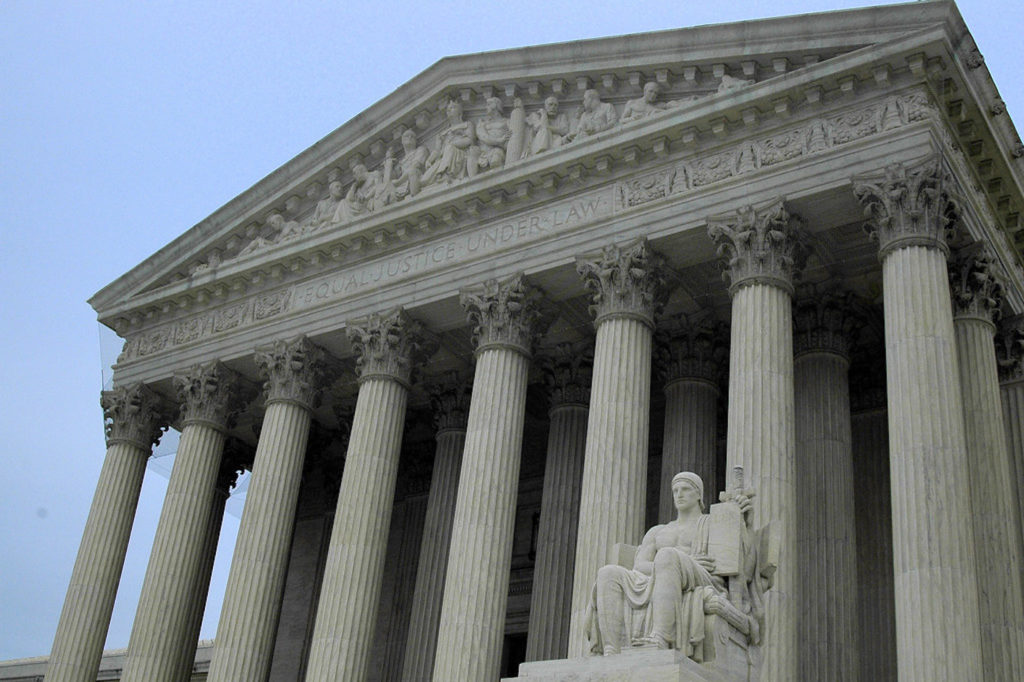In the days following the leak of Justice Alito’s draft opinion in Dobbs v. Jackson Women’s Health, Senator Elizabeth Warren made an appearance outside the Supreme Court. With clenched fists, wide eyes, and a cracking voice echoing above both supporters and opposition chants, she had one message: “I am angry!”
Public displays of rage by politicians are rather mundane these days. It is the language of politics as we know it. But it’s still remarkable to step back and think about just what is making people like Warren so angry: the idea that the American people, through their legislatures, should decide a controversial public question.
Alito’s draft stressed that abortion is “a profound moral issue.” He recognizes that he is fighting against an instinct in American politics that has had the republic by the throat for at least the last century. This is the idea that if an issue is morally significant enough, it is necessarily a constitutional one, to be decided on the basis of this or that “fundamental right” that just must be somewhere in the Constitution.
Moral Principles
Start your day with Public Discourse
Sign up and get our daily essays sent straight to your inbox.Though the United States was conceived in a struggle for local, republican self-government, we have come to view our Constitution as nothing less than a universal arbitrator and guarantor of political morality—a document that does not simply reflect particular moral commitments of its authors and ratifiers, but embodies moral principles to be applied as circumstances require. We look for constitutional meaning in “majestic generalities” seen as wild cards that can be used to encode whatever moral principle is needed into law.
Of course, the content of that political morality is a matter of some debate. This moral reading of the Constitution has its advocates on the left and the right. The former see individual autonomy in the document’s penumbras, the latter sometimes see natural law, natural rights, or (more recently) generic authorizations to promote the common good. Those, like Alito, who would defer to the people’s legislatures are, to the left, little Hitlers and, to the right, Stephen Douglas.
We have come to view our Constitution as nothing less than a universal guarantor of political morality.
But what really underlies all these tendencies is the sense that the people cannot be trusted on the really important issues, especially if it is likely that they will settle these issues differently in their different states. Let them decide on transportation funding, on regulating dog food, or on the height of buildings in their city. On such relatively uncontroversial questions, wrong answers can be tolerated, and difference of opinion managed. But the answer to any question of great moral weight must be discovered once for all in the Constitution and handed down to a public that must be ruled.
Of course, constitutional republicanism does place certain issues on a plane above the typical political process. It is easy, therefore, to present the constitutional framework as identifying the “important” issues and taking them out of the hands of the people. After all, the people’s manifest capacity for error is why we need the protection of political rights. Considering the Constitution in this way, one might reasonably conclude that the rights it encompasses got there because they are the most morally imperative issues. When questions of equal moral seriousness arise, we must find answers in the Constitution as well.
Outrage Theater
But that’s not at all what the Constitution does. Even the rights actually present in the Constitution’s text have not really been taken out of the hands of the people—nor can they ever be so removed in our system in which the people in their states are the final, constitution-making authority. Such constitutional protections just put these questions in a different political and legal context—one that requires near-unanimous political agreement to change through the amendment process.
Likewise, when the Court transformed itself into the final moral arbiter of all state and federal policies by inventing unenumerated rights, it thought it was taking these morally compelling issues out of the political system. The court in Planned Parenthood v. Casey, for instance, boldly declared that the five justices in the majority had closed the issue, and the American people must cohere around their enlightened choice. But the Court can do no such thing, for it too is a part of our political process.
The “discovery” of unenumerated rights in the Constitution merely transfers these issues to yet another form of politics: a politics of performative moralizing and outrage theater designed to pressure courts, control the narrative around uncompromising “fundamental” rights, and appoint the right judges. The issues are no longer subject to our direct political process, in which the people’s representatives in their state capitals are forced to think seriously about serious questions within constitutional forms. They are instead determined by the collective effort of partisans and demagogues screaming on the courthouse steps about how outraged they are that the Court has or has not upheld this or that sacred, inviolable human right. It is a politics of handmaid outfits, viral videos, circus-show confirmation hearings, slanderous rumors, and now leaked opinions and intimidating protests at justices’ homes.
We have a politics of handmaid outfits, viral videos, circus-show confirmation hearings, and now leaked opinions and intimidating protests at justices’ homes.
The political process for constitutional amendments demands consensus. The process for legislation demands compromise and conciliation. The process for manipulating the courts demands anger, extremism, and uniformity.
Ordered Liberty
As Alito so thoroughly demonstrated in his draft, the American people never used the consensus-demanding procedures of the amendment process to put anything about abortion in the Constitution. That’s because no consensus has ever existed. So the question is, which of the other two spheres of politics do we prefer: the increasingly uninhibited and unhinged politics of moral purity, or the imperfect, divergent, and compromise-driven politics of a self-governing federal republic?
Alito’s draft makes a strong case for the latter:
Ordered liberty sets limits and defines the boundary between competing interests. Roe and Casey each struck a particular balance between the interests of a woman who wants an abortion and the interest of what they termed “potential life.” . . . But the people of the various States may evaluate those interests differently. In some States, voters may believe that the abortion right should be even more extensive than the right that Roe and Casey recognized. Voters in other states may wish to impose tight restrictions based on their belief that abortion destroys an “unborn human being.” . . . Our Nation’s historical understanding of ordered liberty does not prevent the people’s elected representatives from deciding how abortion should be regulated.
In other words, self-government does not end when the issues get weighty. Assuming the Court follows through, Dobbs could be a key pivot point back to the ordered, republican decision-making the Constitution demands. It will certainly not be easy. One of the reasons politicians like Warren are so angry is because the path Alito would have us go down leads to their irrelevance. They are not trained to succeed in a legislative politics that demands calm reflection, moral seriousness, long-term efforts to change minds, negotiation and compromise with others, and living with principled disagreement. Their expertise lies in the performance art on the courthouse steps. And that politics thrives when important issues are made in absolute terms by someone else.
Already, Democrats are talking about what other quick end-around will suit them best. And some conservatives are upset that the Court does not seem poised to “discover” a different right in the Constitution to settle the question in the other direction. Many simply do not want to live with the ambiguity and imperfection of a federal republic.
They claim, of course, that such a view of politics is morally unsatisfactory. It certainly is—but only insofar as it reflects human existence itself. While moralistic constitutionalism purports to impose purity from on high, it winds up degrading politics even more than the imperfect but ordered alternative. We will never see a morally pure polity outside the City of God. We might, though, find our way to the kind of ordered liberty to which Alito appeals if citizens and representatives are once again required to take their responsibilities seriously.
It will take a conscious, concerted effort to reframe the debate, to affirm that bold decisions like the one contemplated in the draft opinion are not just the latest salvos in an ongoing ideological war, but a serious move away from the all-or-nothing rights talk of the twentieth century and back to deliberative, federal self-government. We’re still a long way from home. But this unexpected peek into the Court’s work on Dobbs offers a glimmer of hope that there might still be a republic hidden somewhere in the rubble of American constitutionalism—if we can find it.













